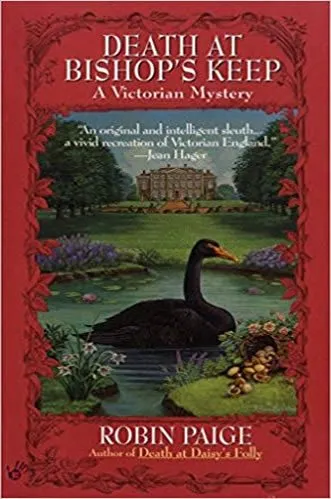An almost perfect day

No high drama, no hilariouslyfunny situations, no exhilarating moments—just a day spent quietly at home withmy nose in a book. It’s cold outside, Christian is fixing supper, I hadleftovers for lunch, and nothing demanded my immediate attention. I evenindulged in eggnog for breakfast—a habit I picked up in Santa Fe overChristmas, and I know better than to let it become regular. But there’s thatbig bottle Jordan bought staring at me every time I open the fridge.
Yes, I slept late, and yes, I “went”to church on my computer. And yes, I had a long afternoon nap. The only otherthing I did of any consequence was to proofread the forthcoming edition of myneighborhood newsletter—at midnight last night, I was still scrambling to getlast-minute articles and changes to the designed, so today I feel pleased thatthere weren’t more corrections than the scattered ones I found.
I’m reading Death at Bishop’sKeep, by Robin Paige, a pseudonym for my friend Susan Wittig Albert and herhusband, Bill. They team wrote it, which is of great interest to me because I can’timagine letting anyone else into my imagination as I crafted a novel. Susantells me they edited each other’s work but, eventually, there had to be one editorialvoice to achieve a consistent narrative style. She was the final voice editor.
Bishops Keep waspublished just after the first few of Susan’s signature China Bayles series,which intrigues me because I would think her writing style—the way she useswords—would have changed over thirty years. Critics often use the word “matured,”but that isn’t quite it—her style was never immature, but I think perhaps todayit has a bit more subtlety. Part of that, of course, has to do with subjectmatter. It is perhaps easier to be subtle about current manners and ways thanit is to go back over a century and recreate the social atmosphere of whichmost readers are innocent. And which sometimes now seem so—what? Trivial? Useless?
The time of Bishop’s Keep islate nineteenth-century England, the dwindling down of the Victorian era.Essex, to be specific. The book is a lot of things that don’t ordinarilyattract me—British for one thing, life and restrictions among the landed gentryfor another, the upstairs/downstairs/below stairs conflicts. But Kate Ardleigh,an American heroine—outspoken, independent, intelligent, and bent on being an author,which was unheard of in the day, especially in England—wipes out all myobjections. Sir Charles—the English nobleman who dabbles in crime detection andthe new science of photography—intrigues Kate to the point that sheoccasionally thinks maybe spinsterhood isn’t for her after all. It’s almost allstandard Agatha Christie stuff (albeit a bit earlier) but it has me hooked, andI have spent a happy day mostly buried in the goings on at the Keep, surely atroubled household. My fascination is in large part due to Susan’s skill with character,even British, and structure.
These days I find I am moreand more selective about what I read. Thanks to Amazon’s sample readingprogram, I often dip my bookmark into three or four books and withdraw it indisappointment. I long for that book that calls me back, tempts me away fromthe work I should be doing, keeps me up late at night. That’s probably why Iread so much mystery, but even within the genre, I find disappointment. So Irejoice when I find such a book. Granted, that enchantment doesn’t alwayshappen in the first twenty pages—you must persevere.
Bishop’s Keep is thefirst of, I think, twelve novels, and I’ll probably go on and read some of the remainingones, though I'll not commit to all--maybe that's what happens to most series. (China Bayles, with twenty-seven books in print, is an exception). Once I am hooked on characters and their fictional world, I want to staywith them. So thanks, Susan, for a good reading experience and a lovely, self-indulgentday.
What about you, dear reader?What book has simply carried you away from your ordinary world, captivated youso that you crave every reading minute?



